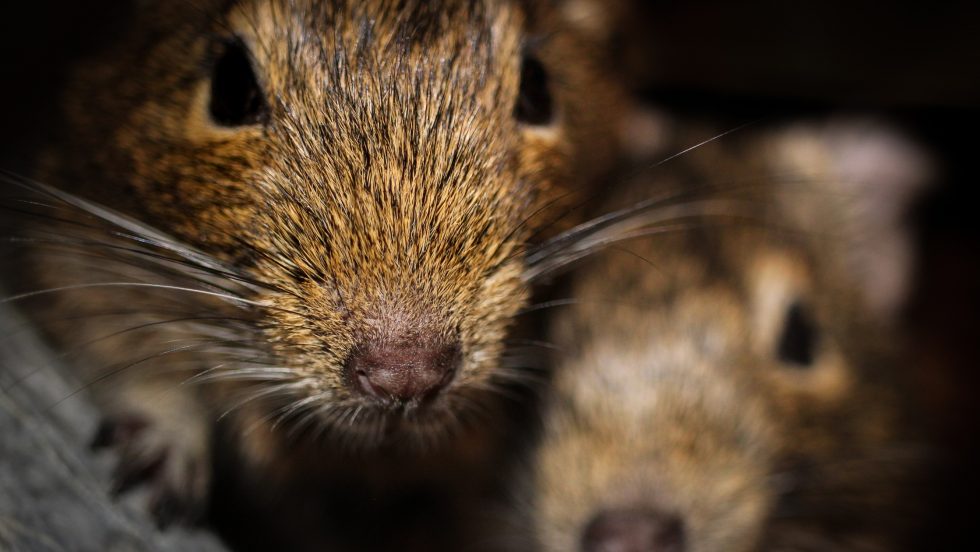
Studies of endocrinology in Chilean rodents shed light on human health.
A hiker in Chile’s open shrublands will see, scurrying among the small bushy plants, colonies of little rodents that look just like guinea pigs except for their long, brush-tipped tails. These common degus (Octodon degus), who live in groups of up to a dozen and spend their days nibbling on seeds and grasses, have become sought-after exotic pets. But to researchers like Carolyn Bauer, PhD, assistant professor of biology, they offer crucial insights into human health.
Dr. Bauer specializes in comparative vertebrate endocrinology, or the study of how the endocrine system—which regulates the hormones that send chemical messages throughout the body—varies across species. “Comparative endocrinology has informed human medicine,” she explained. “New hormones are often first isolated in animals before they are discovered in humans, which can have big implications for human health and behavior.”
For Dr. Bauer, degus are an ideal endocrinological test subject. “Degus are pretty easy to study in the wild because they’re awake during the day,” she said. “They’re also great to work with in the lab, where we can easily videotape them and control for several variables to better understand how certain hormone levels influence their behavior.”

Carolyn M. Bauer, PhD, focuses her research on comparative vertebrate endocrinology, aiming to uncover the relative fitness consequences of different endocrine stress profiles in different environmental contexts.
Indeed, it is the degu’s behavior that makes the animal such an interesting object of study. Degus are intensely social, cohabitating in groups that range from two to 12 individuals. They also engage in plural breeding (mothers share their burrow with other mothers) as well as communal care (mothers care for the offspring of other mothers). Degu pups, like human children, engage in high levels of play. These behaviors allow researchers to study the effects of different forms of socializing on the endocrine system and, therefore, on human development.
Given the volume of research already conducted on degus, Dr. Bauer decided to write a review of relevant literature. “Stress, sleep, and sex: A review of endocrinological research in Octodon degus,” which appeared in the March 1, 2019, issue of General and Comparative Endocrinology, compiled key findings.
Dr. Bauer’s conclusions about stress are of particular interest. “Stress refers to the physiological and behavioral response to an event that is noxious or unpredictable,” she noted. While stress may seem inherently detrimental to our daily lives, the stress response is necessary for our survival. It “helps us out by allocating our energy and resources to the most important systems.” That is, a stress response becomes a hormonal message that helps us handle an adversarial situation—such as, in the degu’s case, a predator who sees it as a tasty snack or a lack of food caused by drought.
Stress becomes problematic, however, when a particular hormonal response is triggered too often and therefore becomes maladaptive. “This is what we call chronic stress,” Dr. Bauer said, “which is linked with all sorts of human health problems, including cardiovascular disease, immunosuppression and reproductive inhibition.”
Dr. Bauer’s literature review also reveals how much community members’ hormonal systems can influence each other. For example, female degus who gestate next to males while in utero will be exposed to testosterone and other androgens and, consequently, will be born more morphologically masculine than their sisters who gestate next to females. Additionally, maternal behaviors can also affect the development of pups. “We found that when mothers were stressed, their pups displayed lower levels of locomotor and social play behaviors,” Dr. Bauer said. From this observation, she concluded that maternal stress can have an adverse effect on offspring’s development.
Still, more research into the degu’s endocrine systems is required to understand how these changes occur and how they relate to general human health. Dr. Bauer plans to continue studying these degus in the hope of helping all of us live healthier lives.
Bauer, C.M., L.A. Correa, L.A. Ebensperger, and L.M. Romero. “Stress, sleep, and sex: a review of endocrinological research in Octodon degus.” General and Comparative Endocrinology, vol. 273, 2019, pp. 11-19.